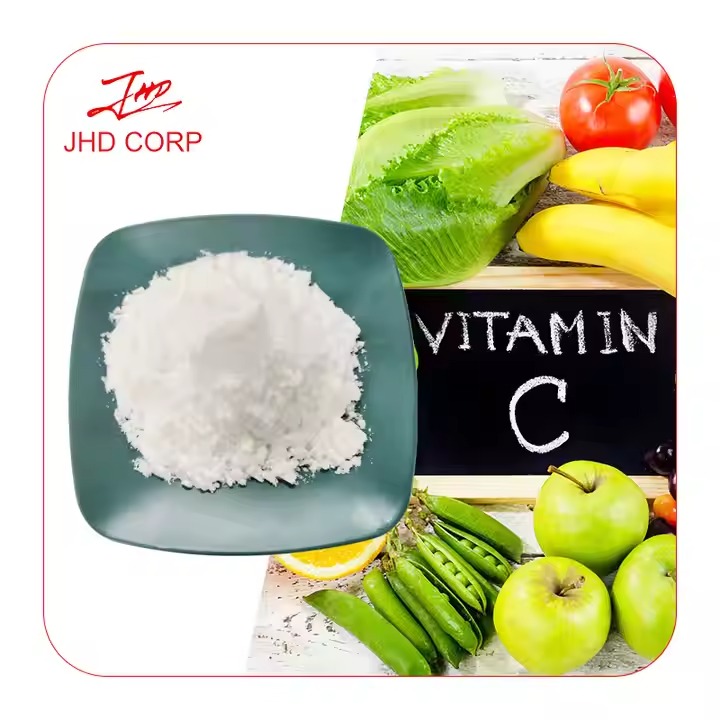Welcome to JHD Nutrasource!
Shop
Ascorbic acid, commonly known as Vitamin C, is a water-soluble vitamin that occurs naturally in fruits and vegetables. It is available in powder form, which is often used for its high bioavailability and ease of incorporation into various products. The powder is typically white or slightly yellowish and has a mild, slightly sour taste.
Description
| Product Name | Ascorbic Acid Powder |
| Specification | 99% |
| Test Method | HPLC UV |
| Appearance | White Fine Powder |
| Certificate | ISO9001 GMP Halal Kosher Usda |
| MOQ | USA/EU Warehouse: 25kg; China Factory: 1kg |
Function
- Antioxidant Properties: Vitamin C is a powerful antioxidant that helps neutralize free radicals, protecting cells from oxidative damage. This can help reduce the risk of chronic diseases and slow down the aging process.
- Collagen Synthesis: Vitamin C is essential for the synthesis of collagen, a protein that provides structure to skin, bones, tendons, ligaments, and blood vessels. It helps maintain skin elasticity, promotes wound healing, and supports overall skin health.
- Immune System Support: Vitamin C enhances the function of the immune system by stimulating the production and function of white blood cells. It helps the body fight off infections and reduces the duration and severity of common colds.
- Iron Absorption: Vitamin C increases the absorption of non-heme iron (found in plant-based foods) in the gastrointestinal tract. This is particularly important for individuals with iron-deficiency anemia.
- Antihistamine Effects: Vitamin C has natural antihistamine properties, which can help reduce allergic reactions and inflammation.
- Cardiovascular Health: It helps lower blood pressure, reduce the risk of heart disease, and improve blood vessel function by reducing oxidative stress and inflammation.
- Eye Health: Vitamin C is a component of the eye’s lens and helps prevent cataracts. It also supports overall eye health by reducing oxidative stress.
Application
Food Industry:
- Fortification: Ascorbic acid powder is commonly added to a variety of foods to enhance their nutritional value. It is used in cereals, fruit juices, energy bars, and other fortified products.
- Preservation: It acts as a natural preservative, preventing oxidation and spoilage in food products. It is often used in dried fruits, jams, and other preserved foods.
- Flavor and Color: Vitamin C can help maintain the color and flavor of foods by preventing oxidation and browning.
Pharmaceuticals:
- Supplements: Ascorbic acid powder is a popular ingredient in dietary supplements, often used to boost immune function, support collagen production, and provide antioxidant benefits.
- Topical Products: It is used in topical creams and serums for its skin benefits, including reducing wrinkles, improving skin tone, and promoting wound healing.
Cosmetics:
- Skincare Products: Vitamin C is a key ingredient in many skincare products due to its antioxidant and collagen-boosting properties. It helps reduce the appearance of fine lines, wrinkles, and age spots.
- Hair Products: It is sometimes added to hair care products to promote hair health and prevent damage from environmental factors.
Nutraceuticals:
- Sports Nutrition: Vitamin C is included in sports supplements to support recovery and reduce muscle fatigue.
- Functional Foods: It is added to functional foods and beverages to provide health benefits beyond basic nutrition.

